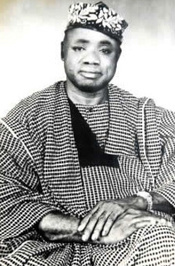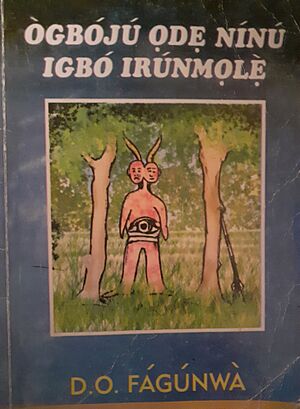Daniel O. Fagunwa facts for kids
Quick facts for kids
Chief
Daniel Olorunfẹmi Fágúnwà
M.B.E.
|
|
|---|---|
 |
|
| Born | Daniel Oròwọlé Fágúnwà 1903 Oke-Igbo, Nigeria |
| Died | 7 December 1963 (aged 59–60) Bida, Nigeria |
| Resting place | Oke-Igbo, Nigeria |
| Occupation | teacher, author |
| Language | Yorùbá |
| Period | 1930–1963 |
| Notable works |
|
| Spouse | Chief Elizabeth Adebanke Fágúnwà (1932–2018) |
Chief Daniel Olorunfẹmi Fágúnwà MBE (1903 – 7 December 1963) was a famous Nigerian author. He is often called D. O. Fágúnwà. He was a pioneer in writing novels in the Yorùbá language.
Contents
Early Life and Education
Daniel Oròwọlé Fágúnwà was born in Òkè-Igbó, Ondo State, Nigeria, in 1903. His parents were Joshua Akíntúndé Fágúnwà and Rachel Òṣunyọmí Fágúnwà. Before his family became Christian, his name was Oròwọlé Jàáníìni. When his parents converted to Christianity, he changed his name to Ọlọ́runfẹ́mi, which means "God loves me."
Fágúnwà went to St. Luke's School in Òkè-Igbó from 1916 to 1924. After finishing primary school, he worked as a student teacher there in 1925. From 1926 to 1929, he trained to be a teacher at St. Andrew's College in Ọ̀yọ́. He met his wife, Elizabeth Adebanke, in 1931 and they got married in 1937.
A Career in Teaching
Fágúnwà had a long and interesting teaching career. From 1930 to 1939, he was the head teacher of the nursery section at St. Andrew's Practicing School in Ọ̀yọ́. He then taught at different schools across Nigeria.
In 1946, Fágúnwà traveled to Britain on a scholarship. When he returned, he taught at the Government Teacher Training Centre in Ibadan for two years. He went back to Britain in 1950, hoping to get a degree. In 1955, he returned to Nigeria to work as an Education Officer for the Ministry of Education in Western Nigeria. He held this important job until 1959.
Becoming a Famous Author
In 1938, D. O. Fágúnwà entered a writing contest. He wrote his first book, Ògbójú Ọdẹ nínú Igbó Irúnmọlẹ̀. This book is known as the very first novel written in the Yorùbá language. It was also one of the first novels written in any African language.
A famous Nigerian writer, Wole Soyinka, later translated this book into English in 1968. It was called The Forest of a Thousand Demons. Fágúnwà wrote several other popular books, including Igbó Olódùmarè (The Forest of God, 1949) and Àdììtú Olódùmarè (1961).
Fágúnwà's Unique Stories
Fágúnwà's novels are special because they use many elements from traditional folktales. His stories often feature supernatural elements and brave Yorùbá hunters. These hunters go on exciting quests and meet kings, wise people, and even gods.
His books also explore important ideas about the differences between Christian beliefs and traditional African religions. Fágúnwà was the first Nigerian writer to use folk philosophy in his storytelling. He also included themes from Greek myths and Shakespearean stories in his books. For example, in Igbo Olodumare, a character tells a story that reminds readers of Romeo and Juliet.
D. O. Fágúnwà is still the most widely read Yorùbá-language author. He has greatly influenced many writers who came after him, like Amos Tutuola.
Awards and Recognition
Fágúnwà received the Margaret Wrong Prize in 1955 for his writing. In 1959, he was made a Member of the Order of the British Empire (MBE). This was a special honor from the British government.
His Sad Passing
On December 7, 1963, Fágúnwà was traveling for work. He was in Bida, on his way back home to Ibadan. He arrived early at the River Wuya and was waiting for a ferry to cross the river. While waiting, he went for a walk along the riverbank. Sadly, he slipped when the ground gave way under his foot. A nearby canoe turned over and trapped him under the water, and he drowned.
His body was found two days later. He was buried in his hometown of Òkè-Igbó at St. Luke's Anglican Church cemetery.
Lasting Legacy
Before he passed away, Chief Fágúnwà was given the title of an Oloye (a traditional chief) of the Yorùbá people.
Today, two schools in Oke-Igbo, Nigeria, are named after him: Fagunwa Memorial High School and Fagunwa Grammar School. His daughter, Yejide Ogundipe, continues his legacy by serving as a council chairperson for Ile Oluji/Okeigbo.
There is also an annual event called Fagunwa Day (formerly Fagunwa Night). This event celebrates his life and encourages people to read his five books. It was started by the Society of Young Nigerian Writers, along with the Fagunwa Literary Society and Egbe Odo Onkowe Ede Yorùbá.
Works by D. O. Fágúnwà
Novels
- Ògbójú Ọdẹ nínú Igbó Irúnmọlẹ̀ (1938)
- Igbó Olódùmarè (1949)
- Ìrèké Oníbùdó (1949)
- Ìrìnkèrindó nínú Igbó Elégbèje (1954)
- Àdììtú Olódùmarè (1961)
Other Writings
Fágúnwà also wrote other books, including travel accounts, primary school readers, and collections of folktales. He even wrote articles for a teachers' magazine.
Translations of His Books
Many of Fágúnwà's books have been translated into other languages, allowing more people around the world to enjoy his amazing stories.
- Ògbójú Ọdẹ nínú Igbó Irúnmọlẹ̀ has been translated into English, Italian, French, and Turkish.
- Igbó Olódùmarè has been translated into English.
- Ìrèké Oníbùdó has an English translation.
- Ìrìnkèrindó nínú Igbó Elégbèje has an English translation called Expedition to the Mountain of Thought.
- Àdììtú Olódùmarè has an English translation called The Mysteries of God.
Images for kids
 | Aaron Henry |
 | T. R. M. Howard |
 | Jesse Jackson |



